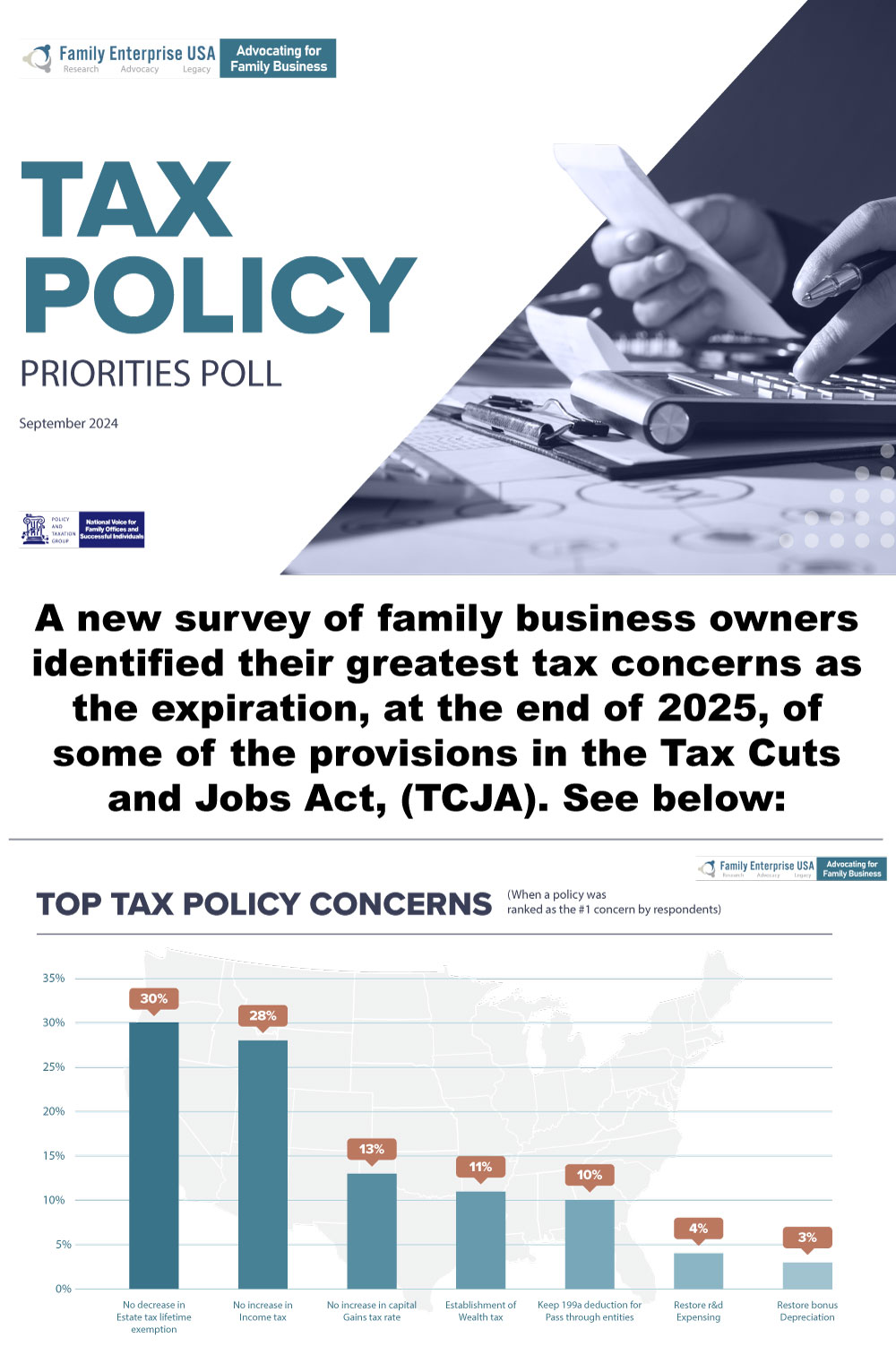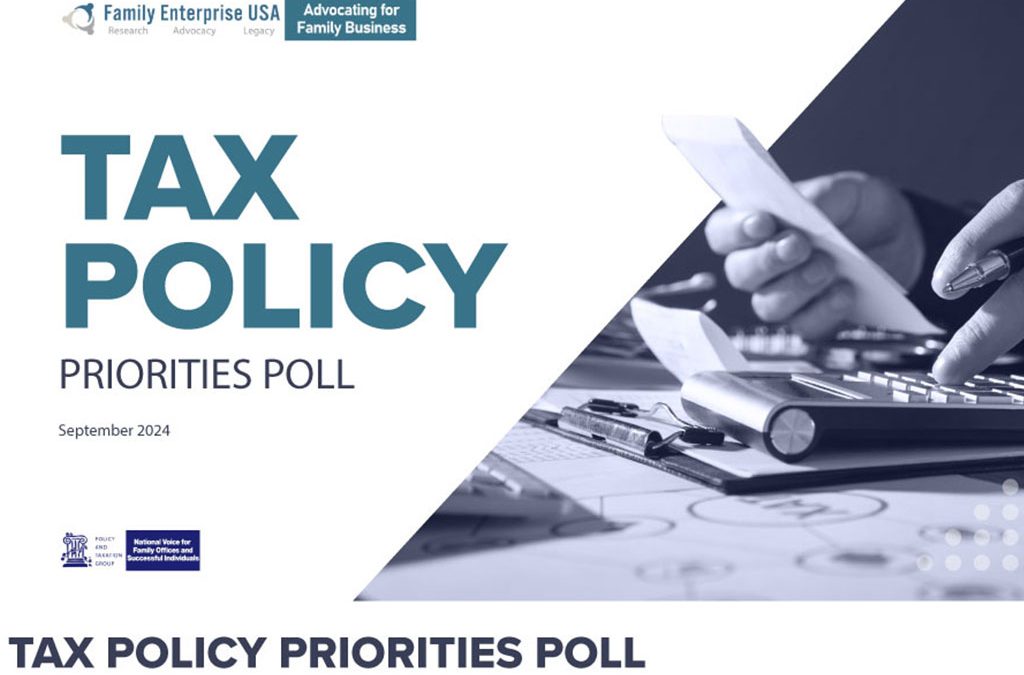Tell Us What Matters Most to Your Family-Owned Business
Next Congress’ Attention to Seven Tax Priorities Are Critical To Protect Family Businesses, Say Polls and Experts
Preserving Current Tax Rates and Brackets Is No. 1 Priority, as Family Businesses Invest More Back into Their Businesses
As the Tax Cuts and Jobs Act heads toward expiration, new bipartisan surveys show, and Capitol Hill tax experts say, seven tax priorities to help family businesses are critical as the 119th Congress grapples with a 2025 tax bill.
In recent surveys and in recommendations from well-known Capitol Hill tax experts working with Family Enterprise USA, seven key tax priorities have emerged as critical to the health and prosperity of America’s largest private employer, family business.
The number one priority, according to both surveys and insights from bipartisan tax experts, is the preservation of the current tax rate and tax brackets enacted under the 2017 Tax Cuts and Jobs Act (TCJA), set to expire at the end of 2025.
This policy recommendation is echoed by two well-known Capitol Hill legislative tax experts from the lobby and law firm Brownstein. Mark Warren and Russ Sullivan, both respected tax policy veterans, have worked on or have helped pen tax policies for legislators for the last 30 years.
Warren, having spent more than two decades serving as congressional tax counsel spanning four administrations, drafted key parts of the TCJA as senior tax counsel in the office of Sen. John Thune (R-SD). Sullivan is Chair of Brownstein’s National Tax Policy Group and is also a veteran of Capitol Hill, serving for nearly a decade as the Democrat Senate Finance Committee staff director.
Brownstein is a partner with Family Enterprise USA and the Policy and Taxation Group, both advocates for America’s family businesses, successful individuals, and family offices.
According to Family Enterprise USA research, America’s generationally-owned family businesses contribute $7.7 trillion annually to the U.S. gross domestic product and are the largest private employers in the country, accounting for 83.3 million jobs, or 59 percent of the country’s private workforce.
Maintaining Current Rates
One reason for maintaining the current tax rates, according to Warren, is that “family-owned businesses rely on the consistency of tax rates more than corporate businesses due to the increased complexity in succession planning,” he said.
In addition, according to Sullivan, “family businesses are uniquely suited to reinvest more in their business, their employees, and their communities.”
Recent research confirms this sentiment.
According to the results of the 2024 Family Enterprise USA Annual Family Business Survey, 82% of respondents indicated that “if they paid less in taxes” they would either invest more in the business or raise employee salaries.
Tax Priorities for Family Business
The next three tax priorities, according to research from Family Enterprise USA and the tax experts, are 1) reduce estate tax rates; 2) make permanent the Section 199A deduction for passthrough businesses; and 3) restore the full deductibility of research and development (R&D) expenses.
“Estate taxes severely hamper the ability for family business owners to pass the business and related assets, which are typically illiquid, to the next generation, making it more difficult for family businesses to continue growing, providing important jobs, and contributing to local communities,” said Warren.
The vast majority of family businesses (78%) operate as passthrough entities, whether a partnership, LLC, S corporation, or other non-corporate structure, according to the 2024 Family Enterprise USA Family Business Survey.
“The Tax Cuts and Jobs Act included a new deduction to help ensure business owners pay tax rates more comparable to the corporate tax rate as reduced by the TCJA,” said Sullivan. “If allowed to expire, the loss of the 199A deduction will severely disadvantage passthrough businesses.”
In addition, restoring the full deductibility of R&D expenses has historically been a bipartisan issue, gaining support from both parties in recent tax discussions and is likely to be included in any new tax bill.
Bonus Depreciation, Capital Gains
The final three tax priorities are restoring bonus depreciation, preserving capital-gains tax rate, and preventing the creation of a wealth tax.
Next to their commitment to their employees, family-owned businesses rely on capital investments to compete, grow, and thrive, Family Enterprise USA research shows.
In addition, bonus depreciation is a critical tool for family businesses to support their capital investments and finance facilities and equipment critical to their ability to grow, expand employment, and contribute to the communities in which they operate, according to Warren.
When it comes to capital-gain taxation, Sullivan believes the current brackets and rates need to remain.
“Like the estate tax, increased capital-gain taxes present an obstacle for capital formation and investments necessary for family businesses to expand, modernize, and succeed in an increasingly competitive market,” said Sullivan.
The two experts, and increasingly owners of family businesses, also agree on the prevention of new “wealth tax.”
A tax on existing assets and unrealized gains will be particularly harmful to family business owners who disproportionately invest in their businesses in the hopes of passing it on to the future generations.
Spot Poll Confirms
In a recent survey of 100 family-owned businesses in 33 states, a Family Enterprise USA “Tax Policy Priorities Survey” asked family businesses what their greatest tax concerns were, from increases in income taxes, to no increases in estate taxes, to restoring research and development expensing.
The results showed the following percentage ranking for the top tax concerns by family business respondents.
The first was “No Decrease in Estate Tax Lifetime Exemption,” which received 30% of votes from respondents.
In a close second place, family businesses wanted to see “No Increase in the Income Tax Rate,” which received 28% of votes.
When it came to “No Increase in Capital Gains Tax Rate,” 13% respondents felt this was a top tax concern, while “Establishment of a Wealth tax” received 11% as a top priority, a worry that is on the rise.
The survey also found the priority to “Keep 199A Deduction for Pass Through Entities” concerned 10% of family business respondents, while “Restoring R&D Expensing” received 4% of the vote.
Lastly, when asked the question about “Restoring Bonus Depreciation,” just 3% of family businesses replied that this was a top priority.
The survey was conducted in early September and results were presented at the recent Congressional Family Business Caucus on Capitol Hill.


About Brownstein Hyatt Farber Schreck
Brownstein Hyatt Farber Schreck is a unique law firm. Walk into any of our offices and you’ll immediately recognize a different type of energy. Complacency doesn’t have a place here. Flexibility and inspiration do. Our culture and enthusiasm allow our attorneys, policy consultants and legal staff to stay ahead of our clients’ needs and provide them with the resources they require to meet their business objectives.
We hope you’ve enjoyed this article. While you’re here, we have a small favor to ask…
As we prepare for what promises to be a pivotal year for America, we’re asking you to consider becoming a supporter.
The need for fact-based reporting of issues important to family offices and successful families and protecting a lifetime of savings has never been greater. Now more than ever, family offices and successful families are under fire. That’s why Family Enterprise USA Action is passionately working to increase the awareness of issues important to family offices and successful families, while continuing to strengthen our presence on Capitol Hill.
Family Enterprise USA Action engages with legislators on Capitol Hill on behalf of family offices, successful families, and family-owned businesses. It is focused exclusively on the critical tax and economic policies that impact them. Since 1995, FEUSA Action has been the leading advocacy group working daily in Washington, D.C., to reduce and eliminate estate tax, gift tax, and generation skipping transfer tax while blocking increased income and capital gains taxes, the creation of a wealth tax, and other hostile policies that punish hardworking taxpayers and success in the U.S. It is a bipartisan 501.c4 organization.
#incometax #CapitalGainsTax #R&DExpensing #DontPunishSuccess #GrantorTrusts #likeKindExchanges #AcceleratedDepreciation #EstateTax #Deathtax #wealthtax #taxLegislation #incometaxrates #repealestatetax #FamilyOffice #SuccessfulFamilies @PolicyAndTaxationGroup @DitchTheEstateTax #PolicyAndTaxationGroup #DitchTheEstateTax #FamilyEnterpriseUSAAction

